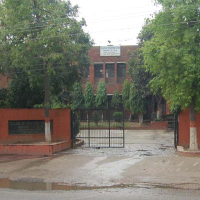Delhi College Demands RTI Applicant Pay Rs. 80,000 ($1,257) for Info
 College of Vocational Studies, Delhi (file photo)
College of Vocational Studies, Delhi (file photo)
A decade has passed since the landmark Right to Information (RTI) Act came into effect, providing ordinary citizens with the power to demand details from their government on its functioning and its decisions. Yet the bureaucracy still finds innovative ways to deny this information, as Kumar Ram Krishna, a history teacher in Delhi, found out recently.
Krishna reportedly suspected irregularities in the purchase of books by the library of the College of Vocational Studies, where he was a teacher. He wrote to the principal about these alleged irregularities but no action was taken.
Krishna then filed an RTI application on November 9, 2012, seeking yearly and department-wise details of book purchases and of payments made to booksellers between April 1, 2003 and November 7, 2012.
But the college asked Krishna, an RTI applicant, for Rs 80,000 ($1,257) for the details he sought, claiming this information was extensive and staff would have to work extra hours to provide it.
“Since the quantum of workload requires at least 10 days working of the concerned library staff, an amount of Rs 80,000 may be deposited by the applicant in the college A/C (bank account) for making the payment of honorarium and conveyance charges to the staff to be engaged,” the college’s public information officer (PIO) wrote back to Krishna.
Krishna then filed another application, seeking details of the money demanded from him.
The PIO responded, saying the college librarian, professional assistant and semi-professional assistant were to be paid a daily amount of Rs 2,000, Rs 1,820 and Rs 1,140 respectively, while the library assistant, senior library attendant and junior library attendant were to be paid Rs 1,120, Rs 1,050 and Rs 870 respectively.
When the Hindustan Times contacted the principal, Dr Inderjeet, he said, “This is an old matter. RTIs are handled by the PIO. You can talk to the PIO.”
But according to RTI activists the college cannot demand this massive amount from Krishna. “It is in complete violation of an October 2009 ruling of the central information commission (CIC),” activist Venkatesh Nayak said.
The CIC had ruled that a public authority could not charge the applicant any amount over the fee fixed under the RTI rules, i.e. Rs 10 ($0.16).
Terming the PIO’s reply as evasive and the break-up of the Rs 80,000 fee as absurd and mischievous, Krishna filed an appeal on June 29. “This is an attempt to harass me and prevent me from obtaining information under RTI Act,” he told Hindustan Times.
The PIO replied on July 2 that the demand for Rs 80,000 had been revoked, but said Krishna would have to pay the fee prescribed under Section 7 of the RTI act.
Any member of the public can send an RTI query to an organisation set up or substantially funded by the government. The applicant has to pay a Rs 10 fee with the application and Rs 2 per page of information requested.
To Learn More:
DU college asks for Rs 80,000 to frame RTI reply: HT Exclusive (by Satya Prakash, Hindustan Times)
RTI Act: A decade of stonewalling information (Hindustan Times)
Increase in RTI applications (Business Standard)
- Top Stories
- Controversies
- Where is the Money Going?
- India and the World
- Appointments and Resignations
- Unusual News
- Latest News
- India College Chain’s Expansion into U.S. Draws Opposition from Massachusetts Officials over Quality of Education
- Milk Shortages in India Tied to Release of New Movies Featuring Nation’s Favorite Stars
- Confusion Swirls around Kashmir Newspaper Ban in Wake of Violent Street Protests
- Polio-Free for 5 Years, India Launches Vaccine Drive after Polio Strain Discovery
- New Aviation Policy Could Increase Service, Lower Ticket Prices






Comments